There are some people, who really think that human civilisation is a blessing even for animals, not the least for wild animals, and that wilderness is the epitome of cruelty and violence. As if everything was better than that. Only hopeless romantics admire the wild and in reality the more civilisation the better. Even to the point that humans should here and now interevene with wildlife.
I couldn’t disagree more.
Every intervention of humans with wild animals so far was a desaster. The best for all involved has always been not to intervene. If you feed wild animals, for example, because you think they suffer in winter, than you produce a lot of problems. For a start, ruminants change their digestive system in winter for a different kind of food and if this is not cared for, they suffer with digestive problems or even starve in front of stacks of food. Further, they come and stay closer together the whole winter, which causes illnesses and parasitic infections. Thirdly, they become dependent on humans, do not move much, and must be cared for from that moment on. And last but not least, they overpopulate and would destroy their habitat if nothing is done about that. If they are not fed, then they would not reproduce as much and some of them would die, but most survive, spread out in the habitat and form a happy, healthy, wild and independent population. Which is better? And which causes less suffering? The answer is obvious: not feeding.
Last weekend, I did a little walk in a narrow valley along a small river in the middle of a forest. Beautiful? Well, I was on a road. And the trees around me were all planted by humans, who had harvested the tree generations before. It was a place that had the hallmarks of human usage. But then I saw an old tree, surely 400 years old, standing there beside the street:
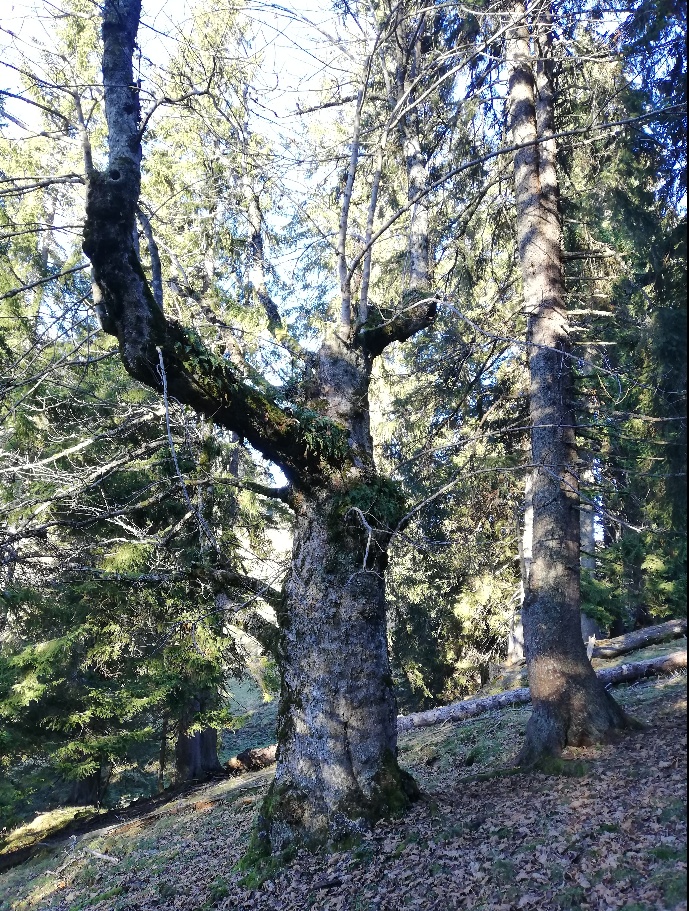
And I imagined the primeval forest that wood had been some 200 years ago, when this tree was in its prime. And I imagined how the place would have looked like, with so many old trees about, without roads and clear cuttings, but with wolves, bears, elks, bison and auerochs. And, yes, that place must have been like paradise then. Its aura, its aesthetic beauty, its smell, its feel. By far surpassing any place with human intervention. I would have felt so different, walking there then, with a close nit group of familiar human fellows.
Harari writes in his book brief history of humankind that before the neolithic revolution, ie before domestication and settlement building, when our forebears here at this place were hunter gatherers, they had to work only 4 hours a day to feed themselves. Harari also writes that their food was much more nutritious and healthy, the population density was far lower and therefore they had fewer illnesses. They were just generally better off. And then I look at a company I recently visited, for car cleaning. The people there work 8 hours a day cleaning cars all the time every day. For me, gathering food in the woods is what I do enjoy in my spare time. Cleaning cars I never would. Hence, the life of hunter gatherers was not just a lot less effort. Every second of that life was joyful – apart from the occasional violent conflict. But could there be anything worse than having to do tedious work all day long and rott in a city?
Harari writes that the neolithic revolution was a bad deal for humans on all fronts. And the idustrial revolution equally. What about wild animals then?
Some while back, I witnessed a driven shoot of deer in a 200 ha wood. 12 deer were shot. All had been healthy and happy individuals. Those, who argue that the wild is a place of misery for the animals, claim that we only see the healthy ones, while those suffering and dying are out of view. Where were they on this occasion? The hunt was supported by many dogs running through the undergrowth and flushing out deer. It seems to me that no sick deer could have been overlooked. As a consequence, the upshot of this hunt was that in these 200 ha of forest, 12 lively and happy deer had lived, until humans brought that to an abrupt and violent end. Were those 200 ha the big exception? Would the next 200 ha have shown a different result? I doubt it. There was nothing special about this place. Fact is that most wild animals are happy most of the time.
Now, those who insist on the misery of wilderness for animals usually point to other animal species, who supposedly suffer. Namely those who procreate in large numbers, the r strategists. Like the tadpoles. They are born in huge numbers and most die before they become frogs. True. This spring, in the Corona lockdown, I visited a little pond with hundreds of tadpoles every day for months. I saw them grow in their jelly, I saw them slip out into the pond water, I saw them gather in there in big flocks, I saw them scuttle around, diving, swimming and sometimes getting very close to each other, while others swam further away alone. I never saw any of them suffer or starve or die. It seemed to me that most were happy during those months. And it makes sense. Evolution would drive animals to be such that they are generally happy under their living circumstances, because that is conducive to them multiplying. Hence, those who feel best under their living conditions procreate more and produce offspring with similar feelings.
And one day I saw a snake in the pond, a grass snake. And most of the tadpoles, who by then had already feet and big bellies, were gone. Eventually the snake left, well fed. And he or she was happy. Most of the tadpoles had died a violent death, no doubt. There were only a dozen or so left, who had managed to hide somewhere while the snake had hunted. So, yes, 95 % of the tadpoles had only some 5 months of life. But it was a happy life, a free life, full of enjoyment. Something you cannot say about humans at a car wash factory. The tadpoles were never bored, they never had to do streneous work, they never were torn in stress between doing this or that or that first, and they never seemed to be ill. They were only stressed on that dreadful day when the snake arrived. Otherwise their lives were well worth living.
You might say, better a boring and streneous life, but long, than only 5 months with a violent end. I am not so sure. But one thing I am sure about: most of the tadpoles were happy most of the time. And if humans were to intervene in one way or other, it would only lead to misery and suffering. If you save the tadpoles from the snake, what is she or he to eat? And if you fetch them in a bucket and shelter and feed them, where will hundreds of frogs live afterwards? And their children?
Looking at the fact, that human civilisation is leading to billions of farmed animals under most miserable conditions in factory farms, where in contrast to wild animals most suffer most of the time, billions of animals hunted and killed violently by humans, billions of humans either starving or being miserable because of the daily work routine they despise and the bordom and dreadfulness of a life in a concrete jungle without apparent sense, chasing from one hedonic pleasure to the next, I clearly see life in the wild superior. In all senses of this word. Even if it might come to an untimely and violent end. Better free and happy, for a shorter while, in a largely untouched wilderness, than caught in the hamster wheel of civilisation.
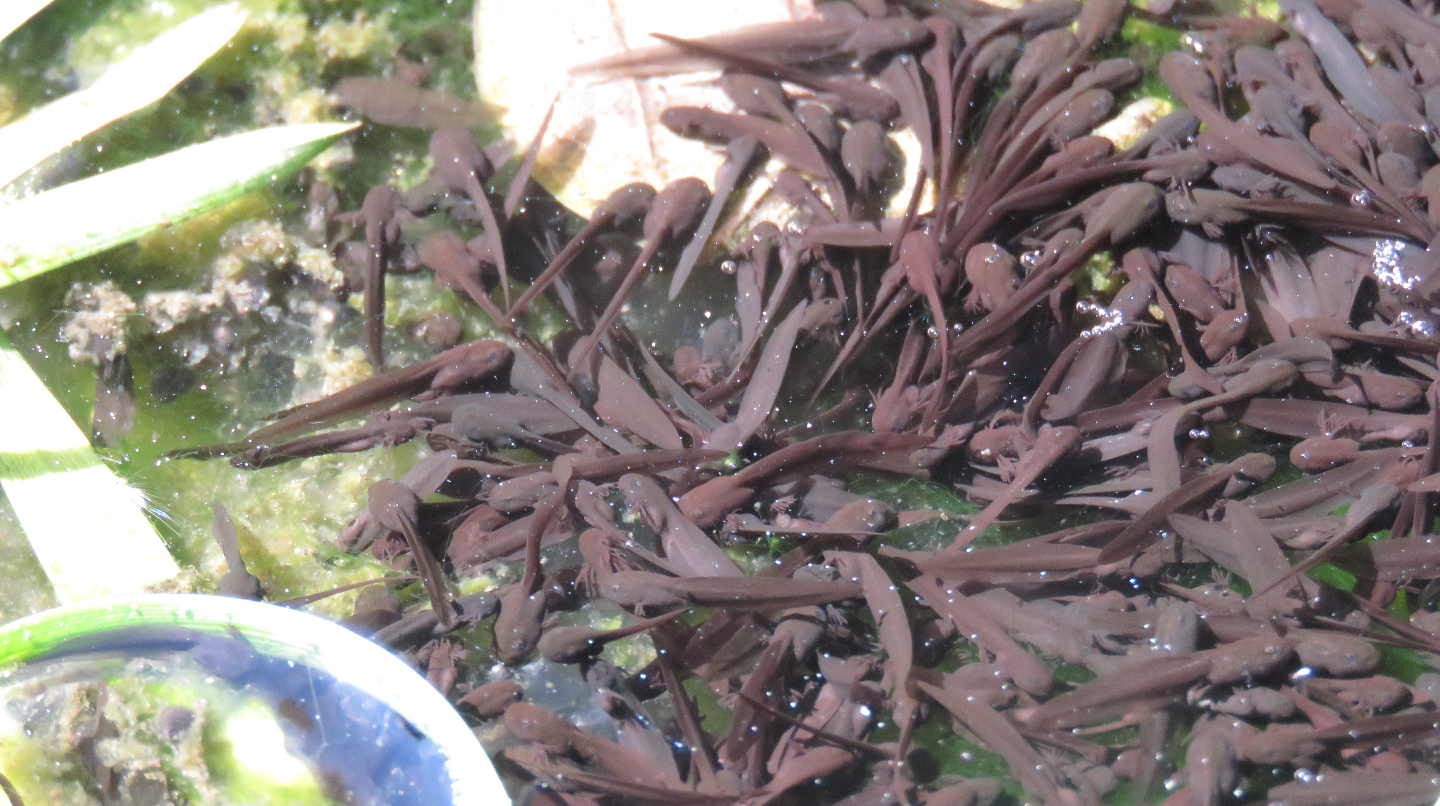
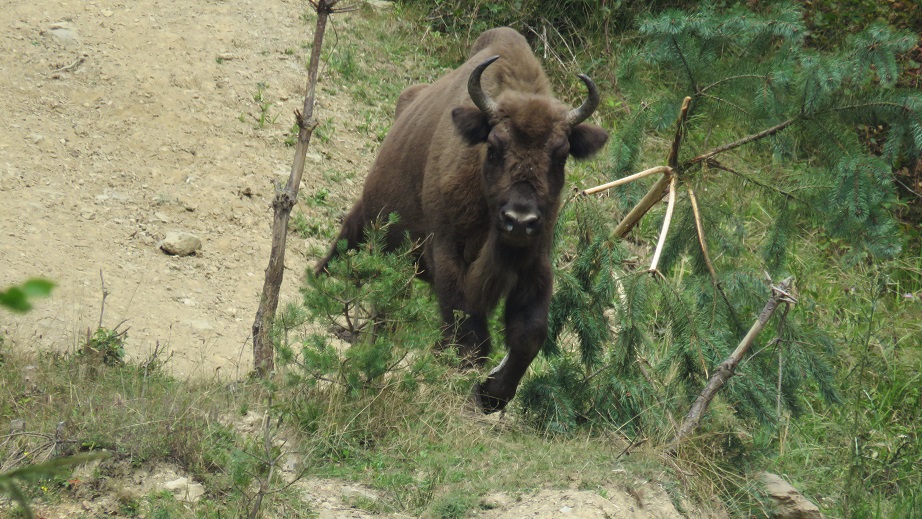
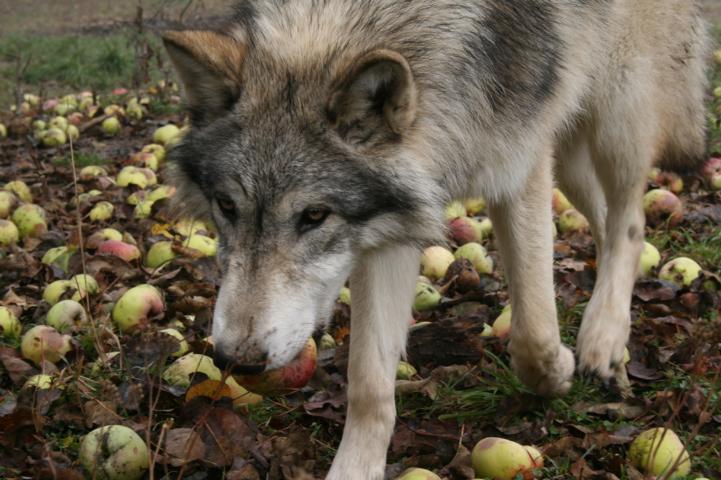
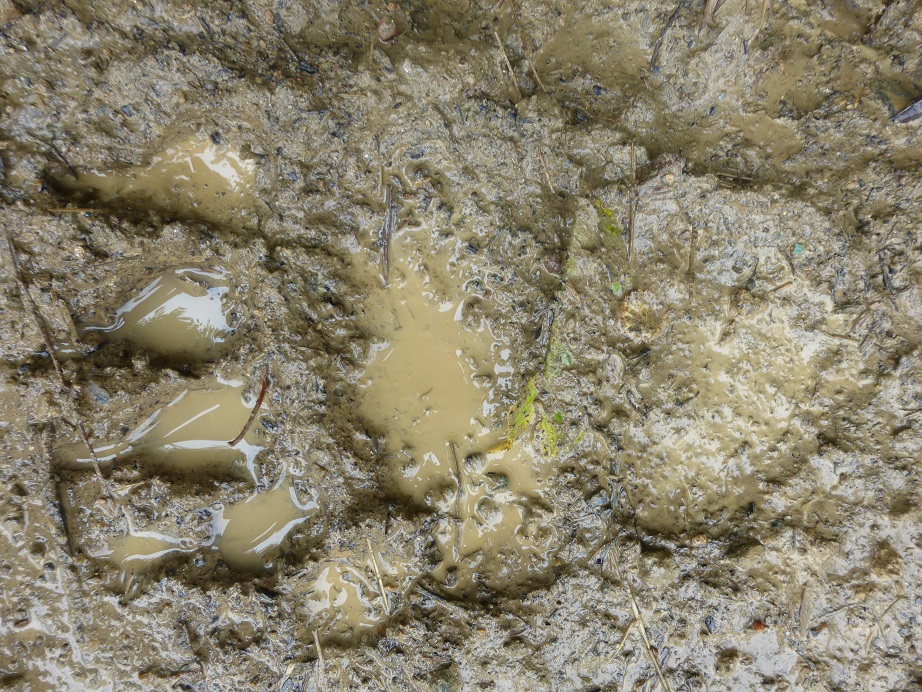
and no I don´t think that humans have made a paradise for themselves. I agree that we have messed up tings and made our lives difficult and ruined the planet. It´s bad enough to be forced to be somewhere from 9 to 5 from kindergarden until retirement. We have given up our freedom and traded it for lifelong constraints and work. I too hate this. But I still think it was an evolutionary process that could not have been avoided. but as far as wild animal´s happiness, which was the topic, I am still not convinced that they really are that happy, when we see that only a small percentage of the young survive and so many animals die under very cruel conditions. and parasites can be so very cruel. like what I mentioned about the hedgehogs and the fly maggots that eat them alive. and your snake and frog. I simply find it horrible. and animals in the wild will not get any help. a heghoge in someone´s garden will possibly get help. who is happier? the one that is left to his own to die or the one that gets help? everyone can be happy until something terrible happens to them. but how often does something terrible happen and what is the life expectancy and how do these wild animals usualy die? old and peacfully or young and violently? But of course even here, nothing can be done ab out it, because this is how wild animals evolved to live. I find it rather cruel, you find that they are all probably happy most of the time. I hope you are right. Intersting discussion.
@Alex Winter
2 points:
– Harari nicely follows this development of humans in his book. And, yes, he also thinks that this was not a good idea. And with hindsight, no-one would have gone down this line. But as it goes, from step to step it looked as an improvement, which as a whole it wasn’t. Even if we look 11.000 years ago and 6.000 years ago. In what is Germany today, the number of humans increased from 4.000 to 800.000, much worse nourished, much more work, much more conflicts, many more violent deaths and a lot more illnesses and violence to nonhuman animals.
– I think a traumatic but brief death and a shorter lifespan but a life of autonomy and complete wilderness with a small social unit is worth it. Being almost 60 years old, I have a feeling what life is like after 50. There is always pain. If you wake up older than 50 and feel no pain after sleep, you are dead, the saying goes. Suicide rate also increases in this age dramatically.
I never said that ” everything develops to ever more complexity”. That is not the case, like you say. But sometimes it happens. Why would that be wrong and not part of the evolutionaly process? Since when does evolution always just make everyone happier? Evolaution probably does not care about happyness, since it´s all about the survival of the fittest. I also would question that 28% of people in the UK really need antidepressant drugs. I rather think that this diagnosis is very often wrong and antidepressant pills are too easily given to everyone who temporarily feels a little sad, which is normal and not a disease. But if you think that humans would have been better off staying in a cave, then that´s your opinion. But no matter what one thinks about it, we definitely do not want to, cannot and will never go back to caves. Or do you think we will? So romanticism about this is of a literary and poetic nature but not really worth discussing in a scientific way.
Evolution doesn’t care about anything, sure, and I do not care much in this context about something being “natural” or not. The decisive question is to what environment did a species adjust. Because if it is adjusted, then its individuals will generally by happy during their life most of the time. That is because those animals, who are happy, procreate more, and hence produce a species that is happy in these surroundings.
In come humans and mess things up, change the environment (for themselves) to such a degree that they are not happy themselves anymore. Small wonder, as they have evolutionarly adjusted to a different environment to be happy in, not double glasing, two adult social units, little phsical exertion and so forth.
Since humans are good in messing environments up, I suggest preserving them. Because then the wild animals will be happy most of the time, as they have evolved to be.
I already posted something here a while ago but you erased it. why? so many organisations will disagree with “Every intervention of humans with wild animals so far was a desaster.” does this mean you are against feeding wild birds? but why? if they do not find enough food anymore then we need to help them. and I also disagree that animals in the wild do not suffer. do you really believe this? what about hedgehogs being eaten alive by fly maggots? not suffering? really? not in need of human help? really? let´s just leave them to their horrible fate and not do anything for them? sounds very cruel to me.
@Alex Winter
I did not erase anything. With intervention of humans I do not mean individual acts but societal policies regarding wild animals. I never said that wild animals never suffer. I said that wild animals are happy most of the time, while domestic animals suffer most of the time. I recently came across a frog fleeing from a snake. My appearance saved the frog, which was also my first reaction. However, a while later I asked myself if I was not cruel by intervening. What if the snake is now hungry?
The fact remains that humans fared in every respect better when they were living a nomadic lifestyle. There are very good arguments why this is the case. I think I am going to write a book about that.
I am looking forward to your book. But your frog and snake story sounds to me like both the frog and snake are suffering. Can they really be happy if constantly under threat of not finding enough food or being eaten? Are wild animals today, with ecosystems being destroyed, really still leading a happy life in those ecosystems where food becomes scarce? If humans have destroyed their habitat and food sources, shouldn´t they at least feed those animals? Feeding wild birds is promoted for that reason. Birds supposedly do not find enough insects anymore, because humans have destroyed their habitat, and therefore humans need to feed the wild birds. Are those individual acts or societal acts? Almost everyone with a garden does it. Every bird society or wildlife society will say you must do it. It´s not a policy, but still a broad social phenomenon and not just individual acts. Is it good to keep the birds from slowly going extinct by feeding them on a massive scale or should we just let nature take it´s course because life in the wilderness without human intervention is the best and most natural of all lives?
@Alex Winter
Firstly, on suffering of humans due to being in the wild (in short). I recently read a book on all we know about the life of those humans, who had made the Venus von Willendorf, this little female figure about 25.000 years ago. This was the ice age. Humans were living here in a Tundra landscape, with only a few trees in river valleys. They shared this world with the cave lion, who had 1,5 m shoulder height, and the cave bear, who was the biggest bear ever, as well as the giant stag, rhinos and mammuths and other big animals. From all findings of human remains we know that they were well capable of managing this environment. They were not hungry or starving, they also helped handicapped people to survive. All in all they were a lot healthier than we are today, had healthier teeth and healthier bodies. They did not know most of the illnesses we have today, as almost all of them are zoonosis from domestic animals. It seems to me that they lived by and large a happy life. They surely did not have more than 30 % depressed people, such a high suicide rate, adepositas, diabetes and so forth.
Secondly, there is the argument from evolution. The feeling of happyness is helping to procreate and to stay healthy. It comes up if you live in the environment your forbears have evolved to live in. Hence, on average circumstances wild animals should feel this happyness most of the time.
What if humans destroy their habitats? Difficult question. I also feed song birds as there are so few insects. And I try to set up things so that there are many insects where I live, like leaving the grass high. Maybe one could argue that if we destroy the environment, we have the responsibilty to re-establish it and help wild animals in the meantime to overcome the hardship. I do not see a pricipled problem with that exception to my general point of view.
But we could also argue that humans, even thow they may have been happy and healthy (what was the life expectancy?) obviously did not want to stay in caves forever and evolved to want something else from life. And that what we have become today is part of natural evolution. Just like the evolution of any other animal. Maybe one day birds will evolve to feel the need to record their songs and invent tape machines and also write down their songs and invent notation. If it is so, it is most likely a process that cannot be avoided. Who is to say this would be a bad thing? The birds want tape machines and nothing will stop them from inventing them. Even thow the birds may have been happier without tape machines, there still would be no way back and it still would be a natural evolutionary process, I think.
@Alex Winter from 1st Nov 2021
I do not care what can be called natural or not. What I did argue, was, that animals are evolutionary evolved to be happy in a certain environment. And if that changes so fast that they cannot adapt, then they will not be happy. New Scientist says that 28 % of people in the UK take anti-depressant drugs. I would argue that clearly proves that something is wrong. I also disagree, in case you argue that, that everything develops to ever more complexity and intelligence. This is clearly not the case. There are many examples where animals became less intelligent and complex in time, especially on islands. Complexity and intelligence only develop, if they are for those animals under those circumstances of evolutionary advantage. And that is not often the case. Humans did not want to leave caves as such. They fell into a trap, into which we all fall every day. Yes, it seems better to eat that fat and sugar rich cream, but it is not healthy. Yes, it feels easier to drive a car than to walk or circle somewhere, but the exhaust fumes kill us and the planet. Yes, it seems better to raise animals than to have to hunt them, but that also meant less food variety, more people to be fed, a lot more illnesses (zoonosis), much more hard work. If people had been able to see the long term consequences, and if they were intelligent, they would have stayed hunter gatherer instead of going through the neolithic revolution. We have paid the price for millenia and we are still paying, possibly more than ever.
I also want to point out that the argument against wildlife suffering AR is the same as against hunting.
.
In nature, life to evolve and for e.g. humans to exist, nature has to select for adoption and strength. E.g. symbolic genetic cycles have evolved between primary consumers (pray animals) and secondary consumers (carnivores). Wolves kill the weak and sick and thereby keep the genepool and ecosystem strong.
.
Human hunters interfere in these cycles by killing the strong and healthy. Often causing even more pain. This disrupts all life on earth and so would intereferring based on wildlife suffering. Even if we could micromanage all of life on earth in a few thousand years, especially the producers like bacteria, fungi and plants, we could not come up with a better system than has evolved for 3,7 billion years.
.
The topic of wildlife suffering does not acknowledge how superior real nature is to our current understanding of the world. The narrative implies a stage where humans are not a part of nature anymore but apart. The narrative also implies false superiority. This narrative is what has led a world where 80+% of all non-human mammals live on factory farms.
Based on science and ethics, noninterference is what should be discussed when it comes to wildlife, not wildlife suffering. It’s bizarre to me that this topics exists and keeps popping up.
Even if you don’t agree with the science and ethics of noninterference, here is another way to look at it.
Mammalian biomass on earth:
Livestock: 60%
Humans: 36%
Wildlife: 4%
https://www.theguardian.com/environment/2018/may/21/human-race-just-001-of-all-life-but-has-destroyed-over-80-of-wild-mammals-study
It’s hard for me to compare the anxieties of modern human life with the expirience of wildlife. It’s also hard for me to compare a long cancer death to being hunted and eaten. The individual cases will cases will vary wildly. Too much security can lead to a lack of excitement and gratitude, which can be as stressful and anxious as too much constant physical threats.
What I am 100% convinced of is that factory farms mean 100% pain and suffering during 100% of animal lives. Given the distribution of biomass and overall suffering, wildlife suffering is a rounding error. Even those “philosophers” who think about it, should only do so marginally if they want to change the world for the better.